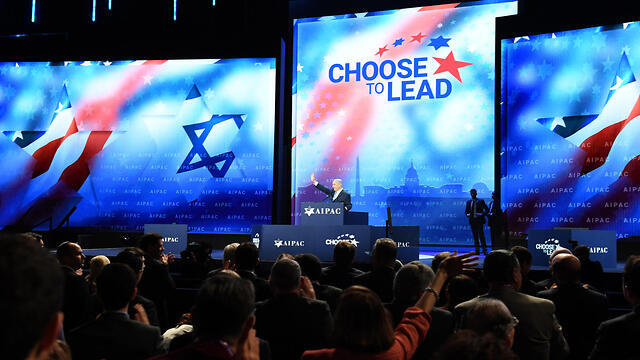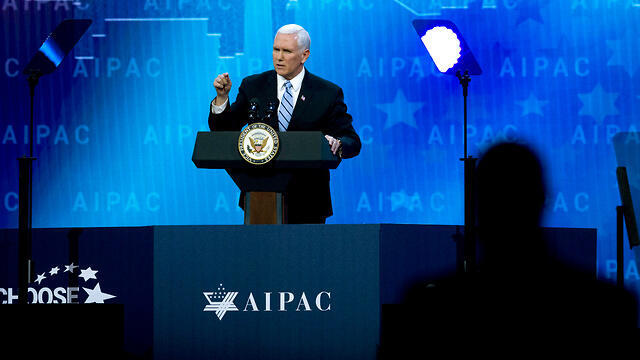Getting your Trinity Audio player ready...
There was no need this week to curb support for US President Donald Trump among participants of the AIPAC Policy Conference .Trump wasn’t there, but the mere mention of his name was met with cheers in honor of Jerusalem’s protector—“the new Cyrus.”
Senior officials in the American administration and in the Israeli government have stressed that the “daylight era” between Jerusalem and the White House—a phrase that characterized the days of President Obama, who wished to create a distinction between the American interest to secure the Arab world’s support for the United States—is over.
The idea that Jerusalem and the White House have different interests undermines the very existence of AIPAC, which has been working for the past six decades to portray Israel and America as conjoined twins.
2 View gallery


In recent years, AIPAC has been affiliated with the Republican Party and with Prime Minister Netanyahu, and is harshly criticized by the liberal US Jewry
(צילום: חיים צח לע"מ)
AIPAC has always taken pride in its “bipartisanship” for the national American interest, while speaking for all US Jews. In recent years, however, AIPAC has been affiliated with the Republican Party and with Prime Minister Benjamin Netanyahu, and is harshly criticized by liberal US Jewry, which even founded J Street as an alternative body.
The dispute over AIPAC among US Jews began in the period of the Oslo Agreements. When AIPAC promoted a resolution to move the American embassy to Jerusalem in Newt Gingrich’s Republican Congress, then-Prime Minister Yitzhak Rabin and US President Bill Clinton were backed into a corner. Rabin was afraid that the law would affect the negotiations with Yasser Arafat and asked AIPAC to postpone the initiative. The Jerusalem Embassy Act was passed in October 1995, a month before his murder. Since then, all US presidents repeatedly invoked a six-month waiver of the application of the law on “national security” grounds. Trump changed the rules of the game.
In the years of the second intifada and after the September 11 attacks, when terror threats dominated the discourse, AIPAC returned to the Jewish consensus. But the equation changed once again during the Obama-Netanyahu era.
In a 2010 article titled “The failure of the Jewish American establishment,” political commentator Peter Beinart scolded AIPAC, accusing the organization of ignoring the feelings of US Jewry’s young generation. Young Jews, he said, are connected to Israel instinctively, but not as much as their parents. They are committed to universal values and human rights and no longer accept the Israeli occupation and religionization policy obediently: “For several decades, the Jewish establishment has asked American Jews to check their liberalism at Zionism’s door, and now, to their horror, they are finding that many young Jews have checked their Zionism instead.”
2 View gallery


US Vice President Mike Pence addresses AIPAC. The mere mention of President Trump’s name was met with cheers in honor of Jerusalem’s protector
(צילום: AP)
Obama built his relations with US Jewry according to Beinart’s liberal spirit. On the eve of the 2016 elections, AIPAC seemed like a divided and terrified organization. It was on the defensive, after being defined as Netanyahu's mouthpiece in the dispute with Obama over the Iranian nuclear agreement .Participants of the 2016 AIPAC conference expected Hillary Clinton to be elected president. Addressing the conference, Trump slammed Obama, defining him “as the worst thing to ever happen to Israel.” AIPAC leaders were forced to apologize onstage after the address for the disrespect shown towards a sitting president.
This week, there was no need for apologies. Israel’s Democratic supporters attended the conference but had to contain their anger and settle for the Avi Gabbay and Tzipi Livni’s presence and for the hope that the Democrats would regain power in 2020.
The Netanyahu coalition’s eagerness to identify with the Republicans is open and unrestrained. Netanyahu and Naftali Bennett’s Israeli Right is sending the following signal to America’s liberal Jews: “We don’t care about your political views and universal principles or about your fear of anti-Semitism.”
National-religious Israel is demanding US Jewry’s absolute support and a rejection of the liberal ethos, which has defined the politics of most US Jews for about 100 years. We could end up paying a heavy price for this blatant demand.

